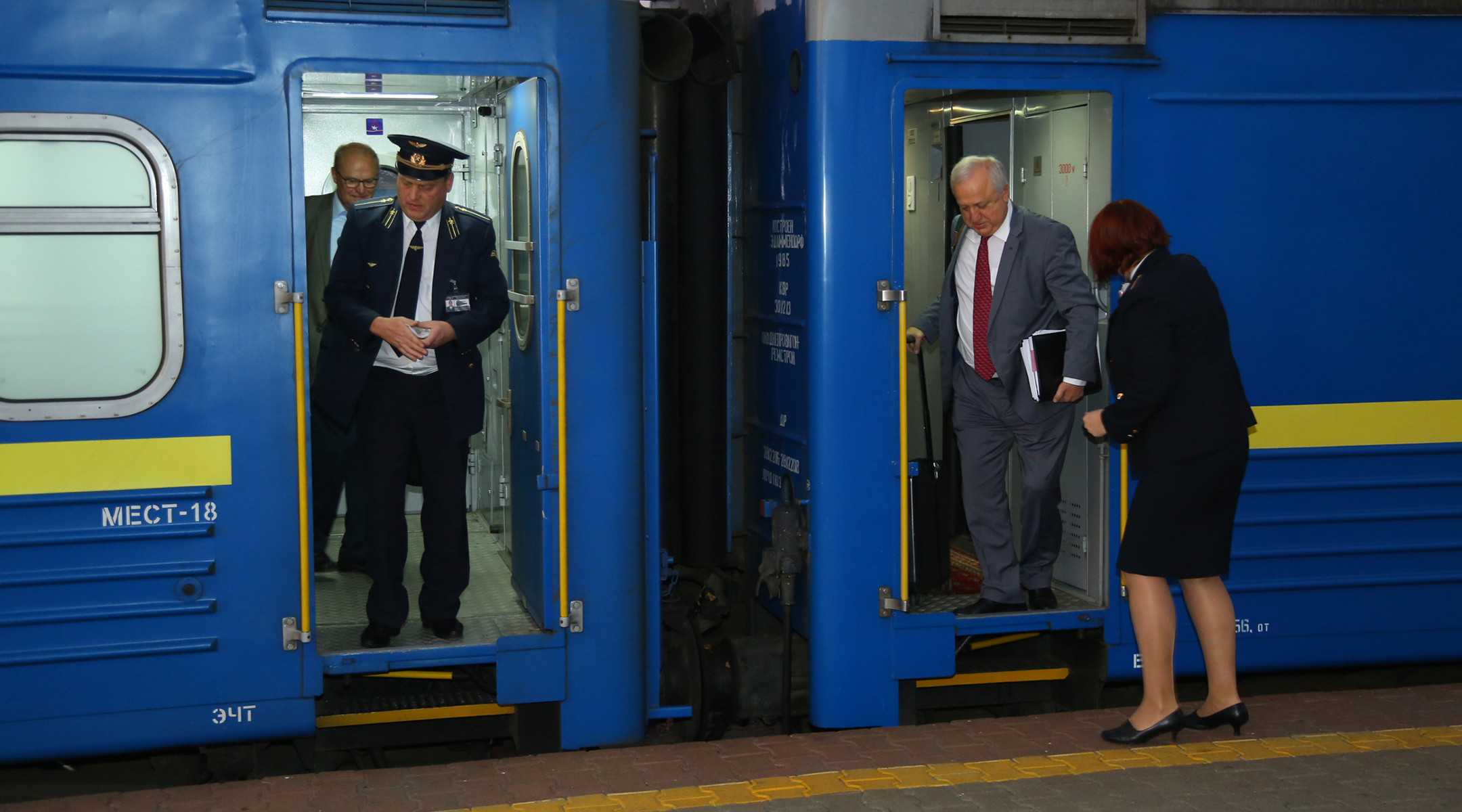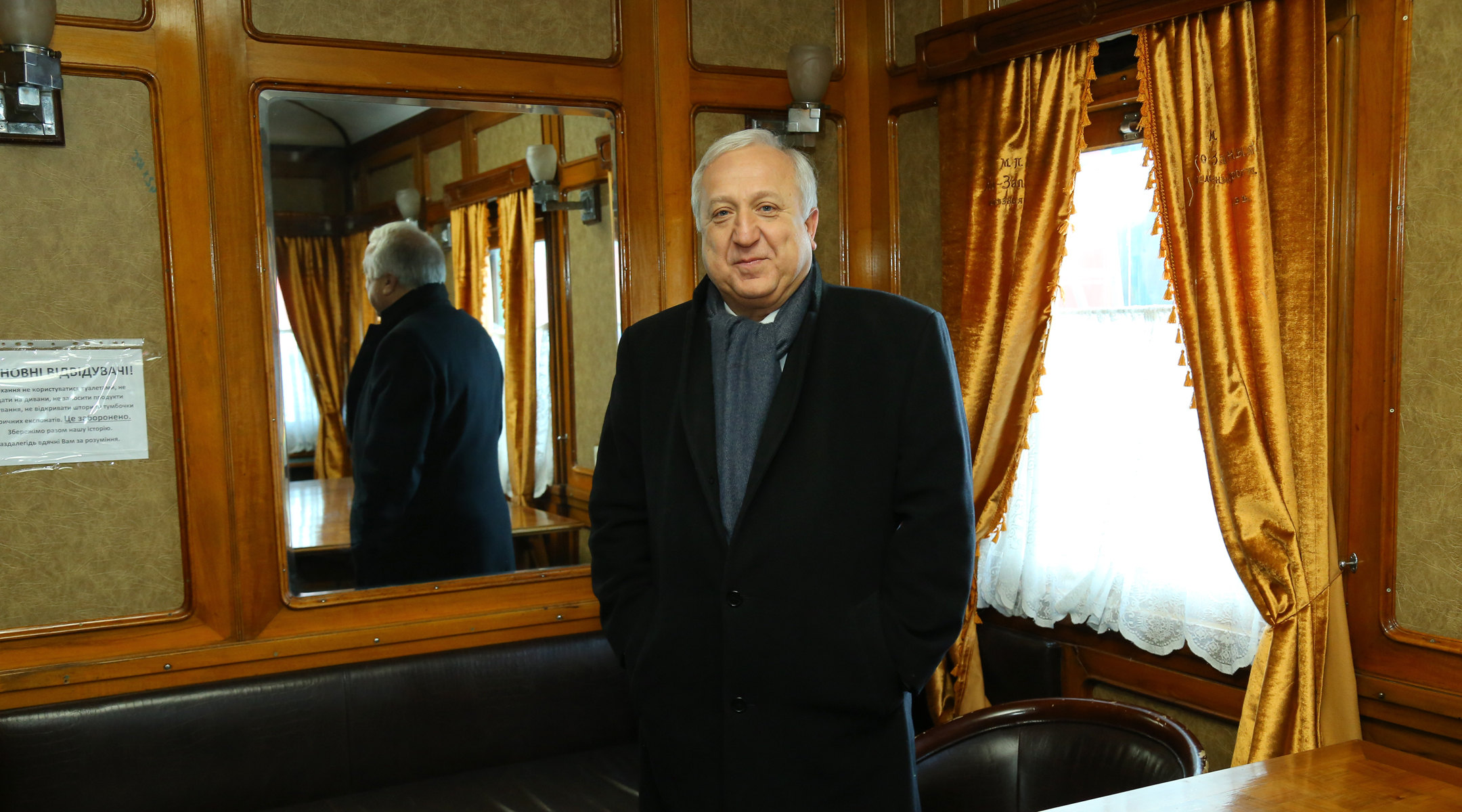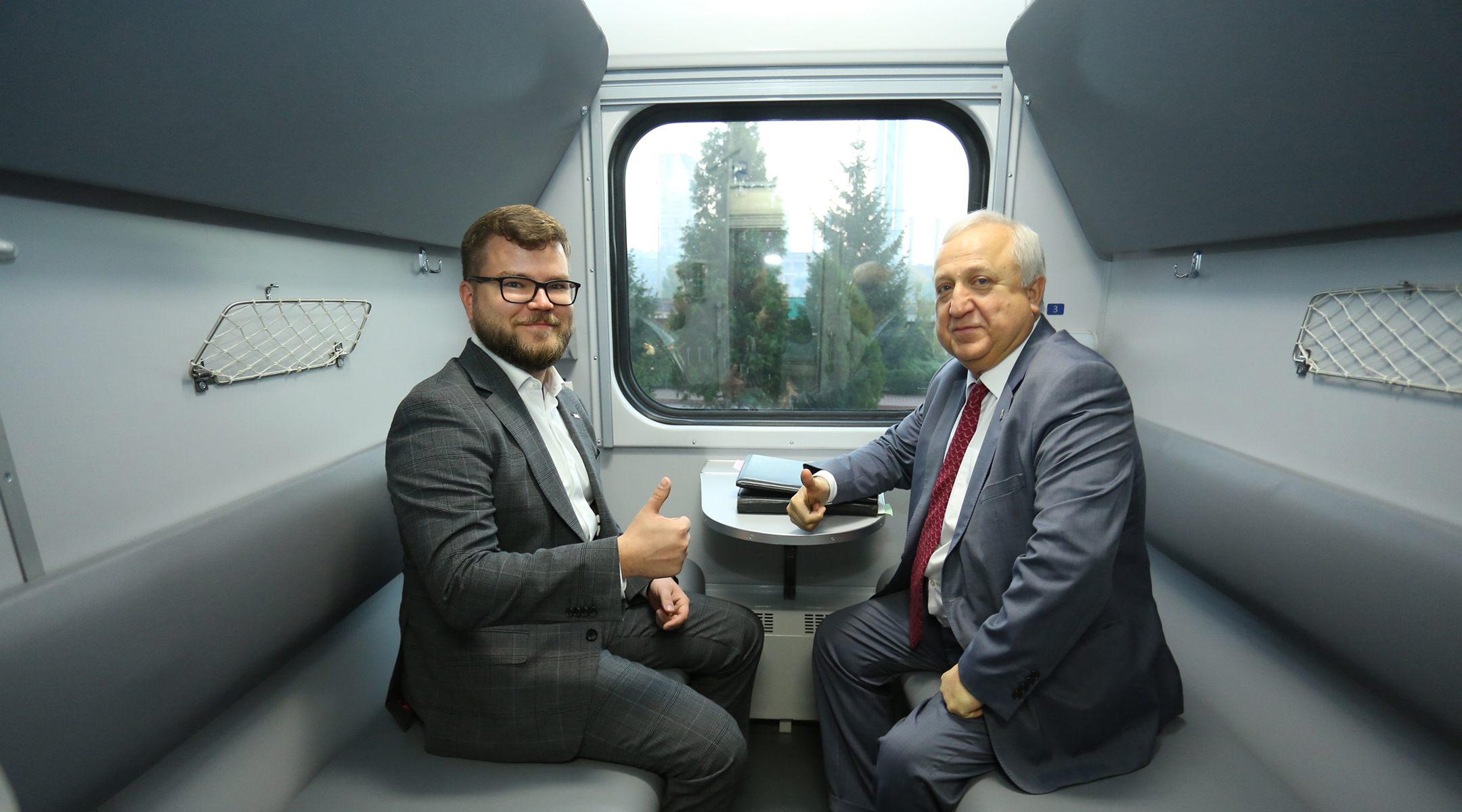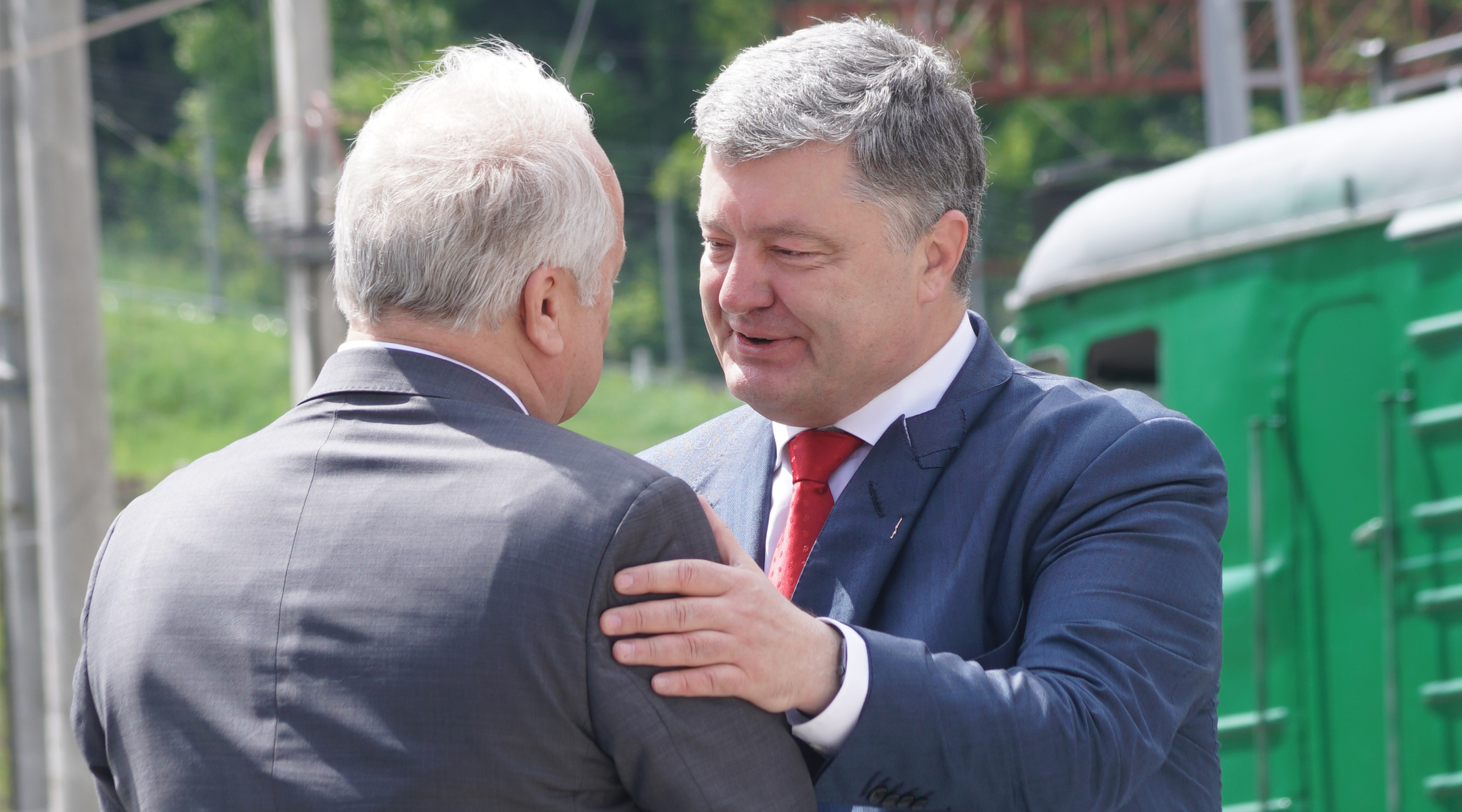Sevki Acuner has significant experience in working with global financial institutions. He has headed the EBRD office in Kyiv for the last five years. Therefore, his nomination and inclusion in the supervisory boards of the largest Ukrainian state-owned companies has become the recognition and continuation of effective work in this period particularly difficult for Ukraine's economy.
Mr. Acuner, a Turkish financier and banker, currently heads supervisory boards at Ukrzaliznytsia and Ukrenergo.
The first six months of work in Ukrzaliznytsia let us talk about the first impressions and results. The supervisory board and management have already developed Ukrzaliznytsia's strategy for 2019-2023. It has recently been presented to representatives of the government, the market, and experts. First of all, the strategic document encourages competition for Ukrzaliznytsia, which, according to Sevki Acuner, is a condition for the company's progress and development.

Question: You have until recently been the Director of the EBRD Representative Office in Ukraine, cooperating with Ukrzaliznytsia. How much of your vision of the Company's development changed after you became the Chairman of its Supervisory Board?
Answer: EBRD has always supported Ukrzaliznytsia with resources to improve the quality of its rolling stock and infrastructure, in particular, and been a key partner.
My vision has not changed much. Now, I'm on the other side of the fence, in Ukrzaliznytsia's camp, and try to help in implementing the company's plans to provide competitive, efficient and quality service.
While working at the EBRD, it was clear to me that Ukrzaliznytsia's team under the leadership of Yevgen Kravtsov was developing very dynamically. And today, when I am in UZ, I see the need for the continuation and deepening of the initiated reforms.
Q: In 2013, when you were appointed to head the EBRD office in Ukraine, you stated that it was very difficult to write a strategic document for Ukraine, when tectonic changes are taking place in the country. In the current conditions in Ukraine, is it easier to develop a strategy for Ukrzaliznytsia?
A: Today the situation is quite a different one. We see an increase in investors' interest, confidence and appetite for Ukraine, and their willingness to provide long-term financing for UZ and other local companies. Investors are looking forward to the further increase in the transparency of economic processes in the country, and bold decisions and actions by the authorities for continued implementation of reforms.

Q: Is the strategy for Ukrzaliznytsia already prepared?
A: The strategy needs to be supported by the government and other stakeholders. Now we are at the final stages of the process of strategy development for Ukrzaliznytsia.
The most important new direction of our strategy is customer orientation, both in freight and passenger transportation.
Among the primary goals of the strategy is to reform the decision-making process in the company when key decisions such as procurement, capital investments and planning of major maintenance and repairs will be made at the level of central executive office, rather than at different regional levels, as the case has been until now. They will be much better organized and financially and operationally efficient and properly monitored.
Financial and economic stability are fundamental for UZ. The fundamental problem in the past was that Ukrzaliznytsia was forced to provide services at the lowest possible and well below cost levels. The consequence of this is the lack of financial resources and the poor state of our assets we face today, especially in locomotives. Our strategy will give Ukrzaliznytsia the opportunity to make the necessary investments in order to ensure the competitiveness of the Ukrainian economy and work for the benefit of Ukrainian citizens.
Q: Is the vision of this strategy the same for all members of the Supervisory Board or someone has the different one?
A: We all want to be sure that we have a coherent strategy that will find support from the shareholder. We have a document approved unanimously, which will soon be submitted to the government.
We are talking about the horizons of vision for five years, but the main tasks must be implemented within a year or two. Consequently, this is not a static but a dynamic document. It is an action plan that will prove its effectiveness on the market.
Q: As the Chairman of the Supervisory Board of UZ, have you repeatedly discussed with the business the idea of automatic indexation of the tariff on the producer price index? Are there any chances to introduce such a model of tariff formation in the industry?
A: If I were a politician, it would be the best proposal for me. This method eliminates political pressures in the system. It is always difficult for politicians to raise prices. But as soon as you establish a rational basis, such as tariff indexation, and connect it to the general increase in the cost of all products in the country, then it completely depoliticizes the process.
It will also be a great thing for the industry, when everyone will have firstly the fair linkage of the value of transportation costs to the value of their production. If the cost of production and products increases, then it is also necessary and reasonable to raise transportation tariffs in parallel. I think that this is the final conclusion not only of the management of Ukrzaliznytsia, but also of the broader industrial community because it provides predictability to the pricing process.
But the general idea here is that the tariffs must be brought to a level that would enable UZ to generate revenues to make the necessary investments as well as to pay back the borrowed funds during the life cycle if the asset financed.

Q: How do you feel about the idea of an independent regulator, such as in the energy sector and in the utilities sector?
A: The presence of a transport regulator, if the rules of the game are well defined to create a level playing field for all and are properly administered, would be fine. Again, this would have to be designed so as to insulate UZ and other players from political interference.
Q: To what extent does the strategy proposed by you take into account the model of rail transportation market which is included in the draft law on rail transport?
A: This draft law envisages the creation of a competitive railroad market. Therefore, all our initiatives are to make UZ more efficient and effective. And thus our strategy encourages competitiveness. Competition makes companies more efficient and strong in the long run and therefore is the engine of growth. One cannot avoid it for ever anyway and it would not be a wise decision for companies to delay facing competition.
However, it is also important that for our transportation sector there should be proper normative regulation and level playing field for all participants otherwise UZ will be vulnerable because it is obliged to fulfill a number of unprofitable public service obligations.
For example, we would like to see a fair compensation for the non-profitable elements of passenger service in order to be able to fulfill all commitments towards the citizens of Ukraine, to improve the quality and speed of service to the population, but to avoid negative consequences of the losses involved in providing some services for the freight transportation sector which ends up subsidizing these services. That is why we are asking for an acceptable compensation structure from central and local authorities for passenger transportation, for the fulfilling of public service obligations (PSO).
Q: The Supervisory Board of Ukrzaliznytsia has been working in this role for over six months. You are well informed about the processes taking place in the company. Where do you see the resources for improving the work of UZ?
A: I have already mentioned some key elements of it, namely - changing the decision-making process, improving efficiency and capacity to attract additional financing resources for investments. Equally important is the fight against corruption and theft. Therefore, we fully welcome the work of the law enforcement bodies in this regard and encourage them to work closely with us to help eliminate any criminal and corrupt practices in the company. I asked for it in a letter to the authorities. While we are developing appropriate processes and measures to fight it, we are not a law enforcement body with the resources and powers that position carries. Fighting the organized crime element which constitutes the big majority of this malpractice against our company is neither within our capabilities nor power. Therefore, we are asking the state's law enforcement authorities to help us eliminate this crime that takes place against the company, thus against the people of Ukraine.
The amount of money that would be saved if this succeeds will be huge. All that money can be used to increase the volume of our investments in a very significant manner.

Q: Volodymyr Kistion, Vice Prime Minister of Ukraine, said that in addition to the UZ strategy, the issue of forming a new management board is important. At what stage is this issue now?
A: You are already aware that the CEO, Yevgen Kravtsov, has already been approved. He fully meets our requirements, but this process must be continued with other members of the management board through a transparent, objective assessment process of each manager;s strengths and weaknesses and ensure a fully competent, fit-for-the-job and coherent management team which would be able and willing to implement our strategic and business plans.
The word team is very crucial here. In this context, the management team has to be fully cooperating among themselves and share the strategic vision that is being developed for UZ. Otherwise, we will fail and that cannot and will not be allowed to happen.
The process of determining the requirements and identifying and reconciling of the profile, the personal and professional competencies required for each key management position is underway.
Q: Do you already have the "personalization" of our management team, short list, long list?
A: We are not at that stage yet. Personalization is the second stage. We need to finish with the first one. Now we are defining and finalizing the requirements, qualifications of each position. Then, on this basis, we will evaluate everyone, whether they meet the requirements, or are improvements needed. As I said before here and on many occasions, it is very important that the team is a coherent one to work together. The team must have a single vision of the goals and objectives under the leadership of our CEO.
They must definitely be a very high-level professional in their fields, but if they are not going to share our unified vision, they will not fit the team.

Q: Additionally, is there an action plan for corporate governance, when will the new management be formed?
A: We have a scheduled meeting of the Supervisory Board at the end of February. Then we will complete and agree on the qualification criteria, and I hope that we will proceed very quickly to the next stage, the stage of assessment against these criteria. We will strive to accelerate this process, but the deadline is the end of the first half of the year. By the end of the first half of 2019 everything will be clear.
Q: What does the work of the Supervisory Board of UZ look like since this was the first experience when the Supervisory Board of a state-owned company was formed under the new procedure? Do so-called independent members and government representatives find common ground?
A: Our work is very coherent and unified. As I said, everyone contributes according their area of competencies, and bring their own opinions, views, their vision, and through a constructive debate we always reach common and best ground. We are able to do this because we have built an unconditional trust in and respect for each other.
At this stage of transformation, it is extremely important to finalize the State Ownership Policy that defines the broad, main parameters of what the state expects the role, the long-term function of UZ to be. We have representatives from the state so we have a permanent view of the state, taken account of in our discussions.
The state, in its turn, develops confidence in the company and its governing and managing bodies because its perspectives are acknowledged and taken account of in the decision-making processes of the company. But the main thing here is to be able to find a consensus of different opinions and views, the best solution to this or that issue.
We have always decided unanimously, we did not have any serious misunderstandings, and we would not want them in the future.
I am positively impressed with the qualifications of my colleagues on the Board of Directors, we have a wonderful blend of the energy, dynamism of youth and wisdom and prudence of experience. Mr. Aslund and me are leaders in the age category, but Kostiantyn Marievych and Ivan Yuryk significantly reduce, "rejuvenate" the average age level of our Supervisory Board.

Q: You are also the Head of Supervisory Board of Ukrenergo? Where do you spend more time?
A: I spend more time in UZ because I have been working for a longer time here. The Ukrenergo Board was formed later. Both institutions and roles are equally important for me, because both companies are extremely important for the Ukrainian economy. Therefore, I consider myself simply to a very lucky person who is present in both companies, there is much work to be done in both boards and companies.
In the energy sector, we are moving towards a new market structure. As you know, we see a major transformation of the sector through the increasing role of "green" energy in the overall energy system of Ukraine. We need to be integrated into the European energy networks, and complete unbundling for certification as independent system operator as per Ukraine's commitments towards Europe and its Energy Community. All these are major challenges and I am very proud to be working towards ensuring we address and meet them.
Finally, I would like to point out here that Ukrainian infrastructure, in terms of both transportation and energy sectors, is in the hands of worthy leaders, and the Supervisory Boards will do their best to provide professional advice, guidance and oversight to the management of both companies.

Mykhailo Androshchenko
Proto credit by Ukrzaliznytsia's press service
